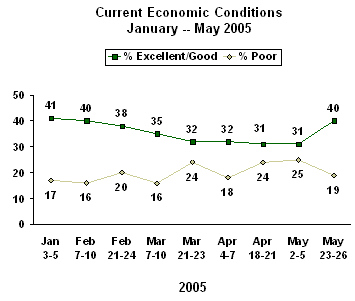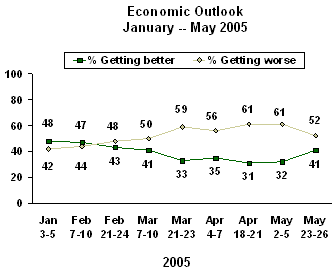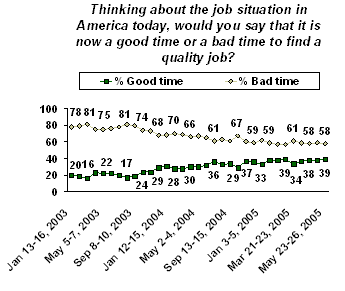GALLUP NEWS SERVICE
PRINCETON, NJ -- Americans have become somewhat less negative about the direction of the U.S. economy, and more positive when asked to rate economic conditions in the country at this time. Despite this improvement, economic attitudes remain quite negative in absolute terms, and a slight majority of Americans continue to say economic conditions are getting worse. Fewer Americans than in recent months mention energy costs as the top economic problem facing the nation today, suggesting that lessening concern about the price of gas may be one factor behind the more positive perceptions. But only 4 in 10 Americans say now is a good time to find a quality job, little changed from previous months.
Ratings of the National Economy
Ratings of both the current economy and the direction of the economy have become more positive in the current poll.
Forty percent of Americans now rate economic conditions in this country as excellent or good, 41% say they are only fair, and 19% say they are poor.

That's obviously not a strongly positive reading, but in perspective, it's the most positive since early February of this year. And the current reading marks a clear break from the more consistently negative readings ║┌┴¤═° has recorded over the last several months.
In similar fashion, there has been a significant change in the American public's responses to the question about whether economic conditions in this country as a whole are getting better or getting worse.

Although still negative, the 52% "getting worse" figure is the lowest since March, and is significantly lower than the 61% recorded in mid-April and early May.
Overall, it's fair to say that while Americans are not exuberant about the economy, they are no longer as negative as they have been in the last two months or so.
Why the Increase in Optimism?
║┌┴¤═°'s late May poll asks Americans to name -- without prompting -- what they perceive to be the most important economic problem facing the country.
The results for this question show a clear drop in the percentage of Americans who believe that fuel or oil prices are the most important economic problem.
What is the most important economic problem facing the country today? [OPEN-ENDED]
|
|
May |
Apr |
Mar |
Feb |
Jan |
|
|
% |
% |
% |
% |
% |
||
|
Unemployment/Jobs/Wages |
18 |
18 |
17 |
22 |
22 |
|
|
War in Iraq |
11 |
8 |
11 |
9 |
14 |
|
|
Healthcare/Health insurance costs |
11 |
7 |
7 |
10 |
11 |
|
|
Fuel/Oil prices |
10 |
19 |
17 |
5 |
3 |
|
|
Outsourcing of jobs |
8 |
5 |
7 |
6 |
5 |
|
|
Social Security |
6 |
7 |
10 |
10 |
12 |
|
|
Inflation/Rising prices |
5 |
4 |
3 |
2 |
3 |
|
|
Lack of money |
4 |
6 |
3 |
4 |
1 |
|
|
Federal budget deficit |
4 |
5 |
7 |
9 |
9 |
|
|
Illegal immigrants |
4 |
2 |
2 |
1 |
1 |
|
|
Trade deficit |
3 |
1 |
1 |
2 |
2 |
|
|
Taxes |
3 |
2 |
2 |
2 |
3 |
|
|
Education reform |
2 |
2 |
2 |
2 |
3 |
|
|
Credit cards/Overspending |
2 |
1 |
2 |
1 |
2 |
|
|
Poverty/Hunger/Homelessness |
2 |
1 |
1 |
2 |
2 |
|
|
Poorly run government/Politics |
1 |
1 |
1 |
1 |
1 |
|
|
Economy (non-specific) |
1 |
1 |
1 |
1 |
1 |
|
|
Gap between rich and poor |
1 |
1 |
1 |
1 |
1 |
|
|
Welfare |
1 |
1 |
1 |
1 |
2 |
|
|
Senior care/Medicare |
1 |
1 |
1 |
1 |
1 |
|
|
George W. Bush/His policies |
1 |
1 |
1 |
1 |
3 |
|
|
Retirement |
1 |
1 |
1 |
1 |
* |
|
|
Foreign aid/Focus on other countries |
1 |
1 |
1 |
1 |
2 |
|
|
Stock market |
* |
* |
* |
* |
* |
|
|
Interest rates |
* |
* |
* |
1 |
* |
|
|
International relations |
* |
* |
* |
* |
1 |
|
|
College tuition expenses |
* |
* |
-- |
-- |
1 |
|
|
|
|
|
|
|
||
|
Other |
7 |
4 |
4 |
5 |
8 |
|
|
None |
2 |
1 |
1 |
1 |
1 |
|
|
No opinion |
9 |
8 |
9 |
10 |
8 |
|
|
Percentages add to more than 100% due to multiple responses. |
||||||
|
* Less than 0.5% |
||||||
While only 3% and 5% of Americans mentioned energy costs as the nation's top economic problem in January and February, respectively, that percentage jumped to 17% in March and then 19% last month. Now, it's down again -- to 10%.
Correlation is no proof of causation, of course, and ║┌┴¤═° has no way of ascertaining precisely whether the drop in concern about energy costs is the driving factor behind the more optimistic view of the national economy. It seems reasonable to assume, however, that it is at least one of the causes.
This conclusion is borne out by the fact that mentions of other economic concerns remain roughly the same: 18% mention jobs, 11% the war in Iraq, and 11% healthcare costs. (Somewhat fewer Americans name Social Security as the top economic concern than did so at the beginning of the year.)
The constancy in concern about jobs is also shown in responses to a closed-ended question that asks: "Thinking about the job situation in America today, would you say that it is now a good time or a bad time to find a quality job?"

The results show no major increase in positive responses compared to previous months this year, although, from a long-term perspective, Americans are now somewhat more optimistic when answering this question than they were in 2003 and much of 2004.
All in all, overall economic optimism is increasing, but perceptions of an improved job market are apparently not the cause.
Survey Methods
These results are based on telephone interviews with a randomly selected national sample of 1,004 adults, aged 18 and older, conducted May 23-26, 2005. For results based on this sample, one can say with 95% confidence that the maximum error attributable to sampling and other random effects is ±3 percentage points. In addition to sampling error, question wording and practical difficulties in conducting surveys can introduce error or bias into the findings of public opinion polls.
